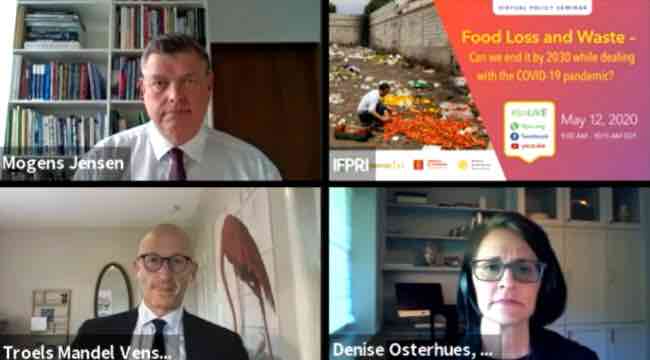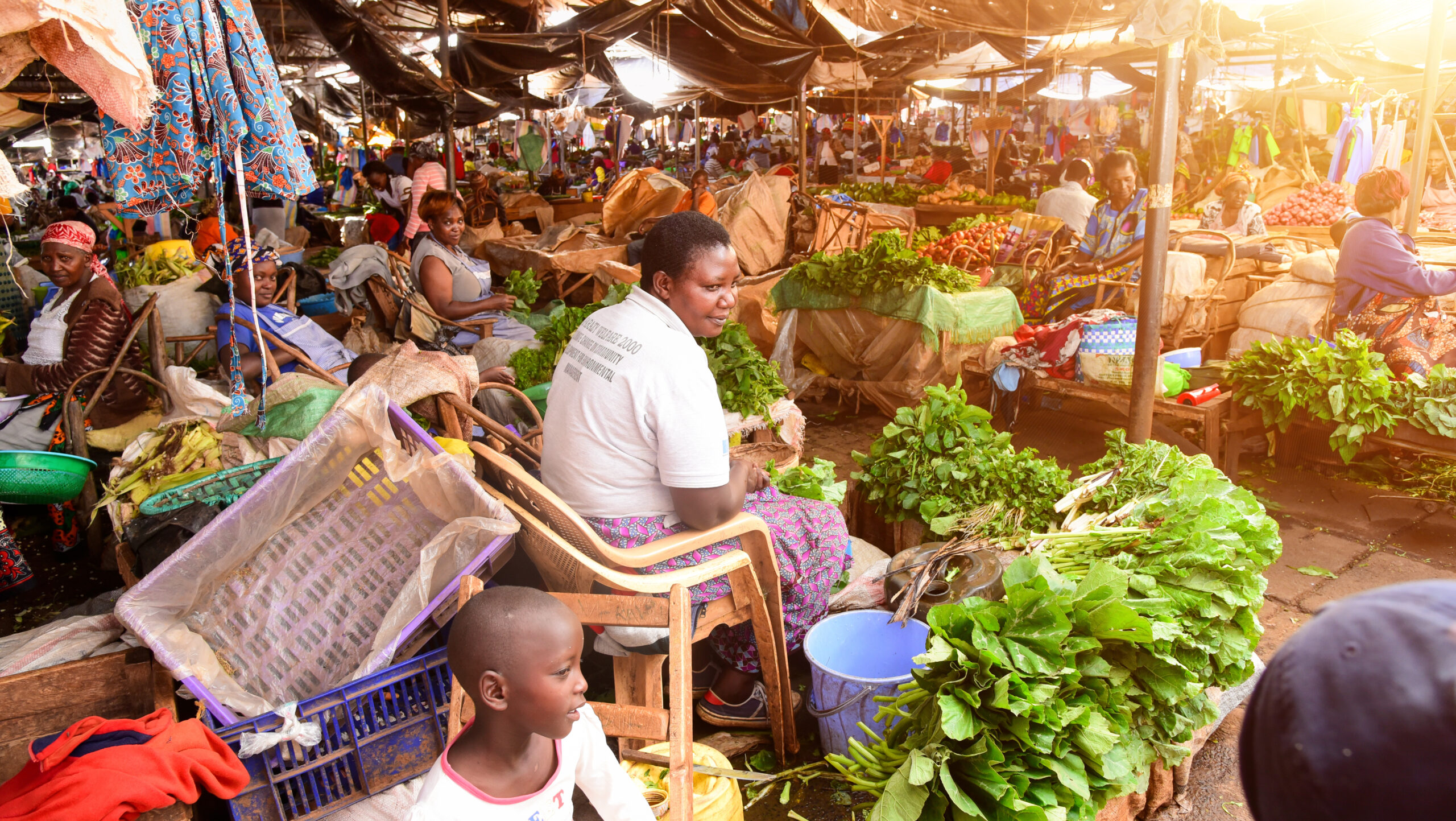Can we meet Sustainable Development Goal 12.3—ending food loss and waste by 2030—while dealing with the COVID-19 pandemic? This was the question posed at a May 12 seminar co-organized by IFPRI, Champions 12.3, the Embassy of Denmark in Washington, D.C., and the World Resources Institute (WRI), where representatives from the public and private sector shared how their organizations were navigating the challenges presented by the pandemic.
“COVID-19 has disrupted food chains and caused changes in demand and consumer behavior. People are lining up at food banks and soup kitchens, and we haven’t even seen all the consequences yet,” said Troels Mandel Vensild, Minister Counsellor of Food, Agriculture and Fisheries at the Danish Embassy. As a result, he said, food loss at the beginning of the supply chain has increased, and with just ten years to go before we must meet SDG 12.3, it is increasingly urgent that we act.
COVID-19 is having varied impacts on food systems. Some value chains continue to operate effectively while others have been heavily disrupted, IFPRI Director General Johan Swinnen said, and the broken links between consumers and producers are resulting in significant food losses. These differences can yield important insights into the resiliency of food systems, he added, underscoring the critical work that IFPRI and partners are doing to measure and address the quantity and quality of food loss and waste.
“In these challenging times, it is important, with close international cooperation, to ensure the food supply chains,” said keynote speaker Mogens Jensen, Denmark Minister for Food, Fisheries and Equal Opportunities and Minister for Nordic Cooperation. Food systems were created with food safety in mind, he said, but the current crisis clearly shows that, going forward, we also need to consider food loss and waste and food security.
Denmark has a strong tradition for collaboration across sectors, and the Danish think tank ONE\THIRD is working on reducing regulatory barriers to reduce food loss and waste, he noted. Denmark has also followed the United Nations (UN) example and declared Sept. 29 a national food loss and waste day, he said, adding that the Danish government looks forward to participating in the 2021 UN Food Systems Summit.
In the United States, food loss and waste rose as the food supply system reacted to abrupt shifts in market demand when lockdowns were imposed, restaurants and other food venues closed, and people stocked up to eat at home, said Stephen Censky, Deputy Secretary at the U.S. Department of Agriculture. This created disruptions as farms and suppliers pivoted from food service to retail, leading some farmers to plow produce under in fields, for example. “This series of problems arose in a matter of days,” he said.
The pandemic has left many farmers without their usual markets and many families lining up at food banks, he said. In response, the U.S. government has launched a series of programs to ensure farmers are supported and food can make it to where it is most needed. One such initiative is the Farmers to Families Food Box Program, which provides family-sized boxes of food to food banks. As it responds to the crisis, the government is maintaining a focus on innovation. “Under the Agriculture Innovation Agenda, we aim to increase U.S. agricultural productivity by 40% while cutting the environmental footprint in half. We have specific goals on water quality, carbon sequestration, renewable energy and of course food loss and waste, which we think is very important,” Censky concluded.
Since 2015, the Danish dairy company Arla Foods has reduced its food loss and waste by 27% by simplifying its supply chain and by taking a food systems approach, according to Arla Senior Sustainability Manager Anna-Karin Modin-Edman. Under current circumstances, she said, keeping global supply chains open and working across sectors and nations is crucial, especially since food security is under threat in many regions, while others have a lot of surplus food.
Dealing with the pandemic has taught Arla Foods some key lessons, she said, including the need to be agile in times of crisis, and the interconnectedness and equal importance of global supply chains and local food production. “We all depend on farmers and well-functioning trade and we should protect both going forward,“ she said.
“The absurdity is really … there is a food surplus, but as we’ve heard, many farmers and producers may no longer have a market if they were producing for food service or for entertainment venues,” said Denise Osterhues, Senior Director for Corporate Affairs at the Kroger Company supermarket chain.
While retail has absorbed some of the excess, she said, it cannot absorb it all, resulting in food waste. While the company is accustomed to pivoting when disasters strike, redirecting supplies to areas in need, Osterhues noted that COVID-19 presents a unique challenge, as it is happening everywhere at the same time, diminishing the company’s ability to divert products from one community to another. In spite of these problems, she said Kroger remains committed to achieving its goal of zero hunger, zero waste. The company is also continuing to stress innovation, she said, for example, by participating in public-private partnership initiatives such as WRI’s 10x20x30 program and dairy rescue programs that take surplus raw milk, pay for the processing then donate it.
The pandemic is impacting diets around the world, said Darci Vetter, vice chair for agriculture, food and trade at the global communications firm Edelman and former chief agricultural negotiator for the Office of the United States Trade Representative. Everyone eats globally, she said, as one of every five calories consumed crosses a border before consumption. While shortages of supplies on grocery shelves and excess at the farm level prompt calls to halt imports or exports, Vetter said, such actions increase food waste. International consumers often eat portions of animals, for example, that domestic consumers may not.
The loss of markets for farmers, increasing unemployment, along with higher prices and lack of consistent supply for consumers are taking a tremendous toll globally Vetter said. To address these problems, it’s important to build capacity for freezing or cooling perishable products closer to the supply chain and to provide direct food assistance to farmers.
IFPRI Markets, Trade, and Institutions Division Director Rob Vos reminded the audience that while many food systems are proving resilient, there are also enormous vulnerabilities, with a number of supply chains buckling. The current crisis, he said, raises three key priorities: Well-integrated domestic and international supply chains with flexible waste systems; improved traceability for both the quality and safety of food; reducing food loss and waste to mitigate climate change and achieve more sustainable use of land and water resources.
“This issue of food loss and waste is more important now than ever, given this crisis,” said WRI Vice President for Food, Forest, Water and the Ocean Craig Hanson. Three things stand out, he noted: the need to protect food workers’ health, for supply chains to reorganze quickly to keep food moving, and that consumers buy what they need – and eat what they buy. “We’re amidst a crisis. History shows that every crisis is a chance for us to focus on what’s important as well as find what’s new,” he said.
“We have 10 years to go, but there’s hope!” said Troels Mandel Vensild of the Danish Embassy. To achieve SDG 12.3, he said, everyone must collaborate and quickly adapt to this new situation, adding that the speakers’ different perspectives convinced him that, “in face of urgency, change is possible.”
Katarlah Taylor is IFPRI Events Manager. Tine Hasling Rasmussen is Commercial Advisor, Food, Agriculture and Fisheries, Royal Danish Embassy, Ministry of Foreign Affairs of Denmark. Jillian Holzer is Communications Manager, Food Program, World Resources Institute.







